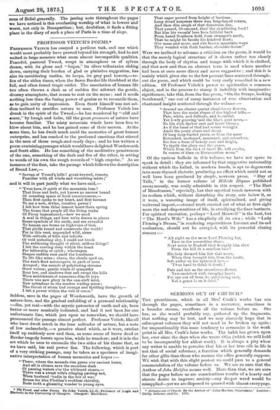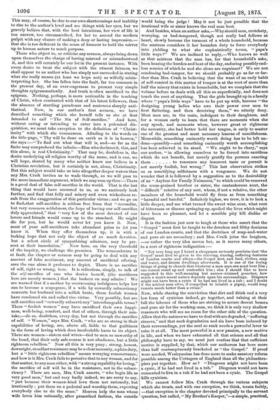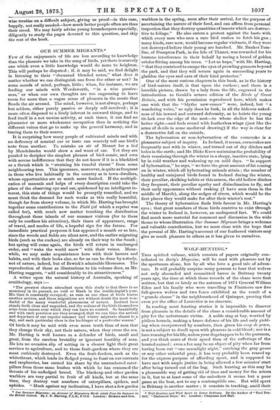SERMONS OUT OF CHURCH.*
THE preachiness, which in all Mrs: Craik's works has run through the pages, sometimes in a narrower, sometimes in a broader stream, overflows all the volume before us. She has, as she would probably say, gathered up the fragments, that nothing may be lost, and we may sincerely hope that in subsequent volumes they will not need to be broken up again ; for unquestionably this same tendency to sermonise is the weak point in all Mrs. Craik's later works. The habit has grown upon her, ever since the days when she wrote Olive (which we still hold to be incomparably her ablest work). It is always a pity when any writer is unable to perceive that his or her true role in life is not that of social reformer, a function which generally demands far other gifts than those who assume the office generally suppose. We wish that with this slight protest we could pass to a general commendation of the volume before us. We are so sure that the Author of John Halifax means well. More than that, we are sure that the pages before us are conscientious results of a hearty and sincere desire to improve society—any deeper wbrd would be misapplied—yet we are disposed to quarrel with almost everypage.
* Sermon, out of Church. By the Author of '-John Halifax, Gentleman." London : Reidy, IsbIster, and Go. 18M.
This may, of course, be due to our own shortcomings and inability to rise to the author's level and see things with her eyes, but we gravely believe that, with the best intentions, her view of life is too narrow, too circumscribed, for her to ascend the modern pulpit with any chance of making a deep or lasting impression,— that she is too deficient in the sense of humour to hold the mirror up to human nature to much purpose.
Those who object to, or criticise any sermon, always bring down upon themselves the charge of having misread or misunderstood it, and this will certainly be our lot in the present instance. With every desire to treat the subject with the utmost fairness, we shall appear to an author who has simply not succeeded in stating what she really means (at least we hope not) as wilfully misin- terpreting her. She has fallen into the fault, far too common in the present day, of an over-eagerness to present very simple thoughts epigrammatically. And truth is often sacrificed to the epigram. Nothing, perhaps, is more noticeable in the teaching of Christ, when contrasted with that of his latest followers, than the absence of startling paradoxes and sentences sharply anti-
thetical. Now, in our author's first sermon, we have described something which she herself tells us she at first intended to call " The Sin of Self-sacrifice." And here, without caring or intending to enter into a polemical dis- quisition, we must take exception to the definition of " Christ- ianity" with which she commences. Alluding to the words on the title-page, " Thy will be done on earth as it is in heaven," she says :—" To find out what that will is, and—so far as the finite may comprehend the infinite—Him who declares it, this, and this alone, is real Christianity." That may be, doubtless is, the desire underlying all religion worthy of the name, and is one, we will hope, shared by many who neither know nor believe in a Christian revelation, but it certainly is not, alone, Christianity. But this subject would take us into altogether deeper waters than any Mrs. Craik invites us to wade through, so we will pass to the more immediate argument, which we may sum up thus :—There is a good deal of false self-sacrifice in the world. That is the last thing that would have occurred to us, so we anxiously look further, and find that folly and misery and even wickedness re- sult from the exaggeration of this particular virtue ; and we go on to find.that self-sacrifice is seldom free from that " recondite, but very common selfishness, the hope of having our self-sacrifice duly appreciated," that " very few of the most devoted of our lovers and friends would come up to the standard. He might die for you, but he would never let you know it. Now, most of your self-sacrificers take abundant pains to let you know it. When they offer themselves up, it is with a lurking hope that not only the object of so much devotion, but a select circle of sympathising admirers, may be pre- sent at their immolation." Now here, on the very threshold of the inquiry, we challenge the premises. The nomenclature is at fault, the chapter or sermon may be going to deal with any amount of false sentiment, any amount of sacrificial offering, save the one alone it professes to depict. There is no sacrifice of self, right or wrong, here. It is ridiculous, simply, to talk of the self-sacrifice of one who denies herself, (the sacrificers here are mostly women,) that the lookers on may admire ! We are warned that if a mother by overweening indulgence helps her son to become a scapegrace, if a wife by cowardly subserviency converts her husband into a selfish brute, these foolish women have condoned sin and called vice virtue. Very possibly, but are self-sacrifice and "cowardly subserviency" interchangeable terms? These " foolish women " may have sacrificed their own happi- ness, well-being, comfort, and that of others, through their mis- take,—do so, doubtless, every day, but not through the sacrifice of self. " Women," says Mrs. Craik, "who are so strong in their capabilities of loving, are, above all, liable to that guiltiness in the form of loving which does incalculable harm to its object. There are women—sisters and wives—tied to men so unworthy of the bond, that their only safe course is not obedience, but a little righteous rebellion." Now all this is very puny ; strong, honest, downright, steadfastresistance may be a clearnecessity, a plain duty, but a "little righteous rebellion" means worrying remonstrance; and how is it Mrs. Craik fails to perceive that to any woman, and for that matter, to any man either, with "a strong capability for loving," the sacrifice of self will be in the resistance, not in the subser- viency? There are men, Mrs. Craik asserts, " who begin life as very good men," but end very badly indeed, we are sorry to say, " just because their women-kind love them not rationally, but irrationally ; put them on a pedestal and worship them, expecting everybody else to do the same." Heaven help the man whose wife loves him rationally, after prescribed fashion, the outside
world being the judge ! May it not be just possible that the irrational wife or sister knows the real man best.
And besides, when an author asks,—Whyshould men, crotchety, worrying, or bad-tempered, though not really bad fellows at heart, slowly become the torment of a whole household, because the mistress considers it her bounden duty to force everybody into yielding to what she euphuistically terms, " papa's little ways ?" We are inclined to reply,—Who knows so well as that mistress that the man has, for that household's sake, been bearing the burden and heat of the day, enduring possibly end- less worries of which he and she alone are cognisant? We are not condoning bad-temper, for we should probably go as far or far- ther than Mrs. Craik in believing that the want of an early habit of self-control in this matter of temper is at the root of more than half the misery that exists in households, but we complain that the volume before us deals with all this so superficially, and does not touch the root of anything. That the girls brought up in a family where "papa's little ways" have to be put up with, become "the designing young ladies who owe their power over men to first flattering, and then deceiving them," we utterly deny. Most men are, in the main, indulgent to their daughters, and for a woman early to learn that there are moments when she may speak, and moments when, however great or righteous• the necessity, she had better hold her tongue, is early to master one of the greatest and most necessary lessons of unselfishness. Meanwhile, something eminently worth doing has to be left un- done—possibly—and something eminently worth accomplishing has been achieved in its stead. " We ought to be chary," says our author, " in allowing ourselves to be forced into sacrifices• which do not benefit, but merely gratify the persons exacting
them to renounce any innocent taste or pursuit is not merely foolish, but wrong." This last observation strikes us as sanctifying selfishness with a vengeance. We do not wonder that it is followed by a suggestion as to the desirability of an "Asylum for Family Nuisances," to which could be removed the cross-grained brother or sister, the cantankerous aunt, the " difficult " relative of any sort, whom, if not a relative, the other members of the household would fly from as from something "harmful and hateful." Infinitely higher, we trow, it is to look a little deeper, and see what turned the sweet wine sour, what root of bitterness or disease springing up, spoiled the lives which might have been so pleasant, and let a sensible pity kill dislike or disgust.
It is the fashion just now to laugh at those who assert that the " Gospel " must first be taught to the drunken and filthy denizens• of our London courts, and that the doctrines of soap-and-water and pure air are secondary ; and Mrs. Craik joins the laughers, —or rather the very idea moves her, as it moves many others, to a sort of righteous indignation
Not very long ago I heard a clergyman seriously proclaim that 'the Gospel' must first be given to the starving, sinning, suffering denizens of London courts and alleys—the Gospel first, and food, clothes, soap and water, and decent dwellings afterwards. It is one of the trying things of going to church that whatever a man says one must hear him ; one cannot stand up and contradict him ; else I should like to have suggested to this well-meaning but narrow-visioned preacher, how much a man's moral nature depends upon his surroundings. Diogenes might not have been a cynic if he had not lived in a tab ; and I doubt if the noblest man alive, if compelled to inhabit a pigsty, would long remain much better than a swine."
Now, while sharing the conviction that dirt and drink and a very low form of cynicism indeed, go together, and valuing at their full the labours of those who are striving to secure decent homes and pure air for the working-man, we think it is only very shallow reasoners who will see no room for the other side of the question. Allow that the natures we have to deal with are degraded, "suffering sinners," and that such degradation and sin have been induced by their surroundings, yet the soul so sunk needs a powerful lever to, raise it at all. The most powerful is a new passion, a new motive in life, and when we have exhausted all that science and all that philosophy have to say, we must just confess that that sufficient motive is supplied, by that, which our authoress has here more than half contemptuously bracketed as " the Gospel." If proof were needed, Wesleyauism has done more to make sanatory reform possible among the Cottagers of England than all the philanthro- pists put together. How so ? "Diogenes might not have been a cynic, if he had not lived in a tub." Diogenes would not have consented to live in a tub if he had not been a cynic. The Gospel
kills cynicism.
We cannot follow Mrs. Craik through the various subjects which she treats, and with one exception, we think, treats feebly,, —that exception is the chapter devoted principally to the servant question, but called, " My Brother's Keeper,"—a simple, practical, wise treatise on a difficult subject, giving us proof—in this case, happily, not really needed—how much better people often are than their creed. We may fairly advise young housekeepers especially, diligently to study the pages devoted to this question, and skip the rest of the book.
































 Previous page
Previous page